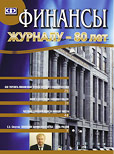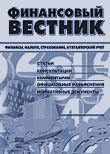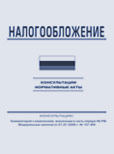Содержание
ФИНАНСЫ И БЮДЖЕТ: ПРОБЛЕМЫ И РЕШЕНИЯ
Е.В. Лебединская, директор Департамента доходов Минфина России
E-mail: finance-journal@mail.ru
Министерство финансов Российской Федерации проводит последовательную работу по модернизации и унификации системы администрирования, прогнозирования и анализа доходов бюджетов бюджетной системы.
Основная цель данной работы – сделать систему управления доходами для всех участников бюджетного процесса более эффективной, понятной и прозрачной, максимально перевести ее в электронный вид, унифицировать все шаги работы с бюджетными доходами – от закрепления полномочий по их администрированию до формирования прогноза и отчетности, работы с дебиторской задолженностью по доходам. О том, как решаются обозначенные выше задачи, ведется речь в этой статье.
Ключевые слова: Минфин России, система управления бюджетными доходами, главные администраторы доходов бюджетов, состав источников доходов, учитываемых главным администратором, список администраторов доходов, прогнозирование поступлений доходов.
М.Л. Васюнина, заведующая кафедрой общественных финансов Финансового факультета Финансового университета при Правительстве Российской Федерации, кандидат экономических наук, доцент
E-mail: MVasyunina@fa.ru
Статья посвящена вопросам развития бюджетного субсидирования в научно-технологической сфере. Достижение национальной цели развития «Технологическое лидерство» сопряжено с поиском новых подходов к трансформации одного из наиболее активных инструментов прямой государственной поддержки. Целью работы является анализ влияния бюджетных субсидий на реализацию важных направлений развития научно-технологической сферы – наращивание внебюджетных затрат на проведение исследований и разработок и усиление патентной активности хозяйствующих субъектов. В статье определены направления донастройки бюджетных субсидий с позиции решения задачи повышения уровня частного финансирования НИОКР и поддержки патентной индустриализации.
Ключевые слова: бюджет, внебюджетное финансирование, грант, инновации, научные исследования, наука, НИОКР, патент, субсидия, технологии, технологическое лидерство, технологический суверенитет.
НАЛОГИ: ТЕОРИЯ И ПРАКТИКА
А.З. Дадашев, руководитель Центра налоговой и бюджетной политики Института региональных экономических исследований, профессор кафедры экономики и бизнеса Московского экономического института, доктор экономических наук, профессор
E-mail: azd120840@yandex.ru
Д.А. Мешкова, заведующая кафедрой государственного и муниципального управления Московского экономического института, кандидат экономических наук, доцент
E-mail: artego2005@mail.ru
Ю.А. Топчи, доцент кафедры государственных и муниципальных финансов РЭУ им. Г.В. Плеханова, кандидат экономических наук, доцент
E-mail: Topchi.YA@rea.ru
В статье впервые выделены и исследуются структурный и эволюционный аспекты (виды) модернизации системы налогов и налогообложения на примере подсистемы специальных налоговых режимов. В связи с этим проанализированы действующие режимы: упрощенная система налогообложения; патентная система налогообложения; единый сельскохозяйственный налог, а также дана оценка их современного состояния и привлекательности для организаций и индивидуальных предпринимателей.
Ключевые слова: структурная модернизация, эволюционная модернизация, специальные налоговые режимы, организации, индивидуальные предприниматели, налоговые новации.
О.А. Синенко, ведущий научный сотрудник Института исследований социально-экономических трансформаций и финансовой политики Финансового университета при Правительстве Российской Федерации, кандидат экономических наук, доцент
E-mail: oasinenko@fa.ru
Целью исследования является оценка эффективности налоговых расходов Свободного порта Владивосток (СПВ) на территории Дальневосточного федерального округа Российской Федерации. В настоящее время завершается начальный этап развития Свободного порта Владивосток - десятилетний период, характеризующийся предоставлением первым зарегистрированным резидентам основных налоговых преференций. В данных обстоятельствах особую значимость приобретает проведение комплексной оценки результативности и эффективности имплементации данного преференциального режима в качестве инструмента государственной политики, направленной на территориальное развитие Дальневосточного федерального округа. В статье обоснованы рекомендации по совершенствованию существующего механизма налогового стимулирования правового режима Свободный порт Владивосток с целью повышения его результативности в контексте достижения стратегических целей регионального развития.
Ключевые слова: свободный порт Владивосток, налоговые преференции, налоговые расходы.
ФИНАНСЫ СОЦИАЛЬНОЙ СФЕРЫ
Ю.А. Орещенкова, заместитель директор Научно-исследовательского центра развития государственной пенсионной системы и актуарно-статистического анализа Финансового университета при Правительстве Российской Федерации
E-mail: yaoreshchenkova@fa.ru
Статья посвящена оценке роли самозанятых граждан в формировании доходной части бюджета Социального фонда России (СФР) в условиях современной экономической реальности. Актуальность исследования обусловлена стремительным ростом числа самозанятых лиц и необходимостью оценки их вклада в социальное обеспечение.
Цель исследования заключается в анализе порядка уплаты и объемов уплаченных самозанятыми и инициальными предпринимателями страховых взносов в бюджет СФР и оценке экономических последствий предоставляемых льгот.
В рамках исследования обоснованы высокие риски роста расходов федерального бюджета на выплату социальных пенсий, федеральных и региональных социальных доплат для данной категории граждане. Показан высокий уровень перераспределения объемов страховых взносов между наемными работниками и самозанятыми гражданами на выплату пенсий. Предложен многоуровневый подход к формированию пенсионных прав самозанятых граждан, направленный на создание экономически обоснованного механизма формирования пенсионных прав, установление справедливого уровня перераспределения и обеспечении их солидарности в финансировании пенсионных расходов.
Ключевые слова: самозанятые граждане, обязательное пенсионное страхование, страховые взносы, индивидуальные предприниматели, налог на профессиональный доход, страховая пенсия.
ФИНАНСОВЫЕ РЫНКИ
Д.А. Артеменко, профессор кафедры общего и проектного менеджмента Факультета «Высшая школа управления» Финансового университета при Правительстве Российской Федерации, доктор экономических наук
E-mail: DAArtemenko@fa.ru
В.С. Воробьев, аспирант кафедры общего и проектного менеджмента Факультета «Высшая школа управления» Финансового университета при Правительстве Российской Федерации
E-mail: vorobyev2605@mail.ru
В статье рассматриваются актуальные вопросы взаимодействия банковских и страховых организаций в рамках модели банкострахования, которая становится ключевым инструментом интеграции финансовых услуг. Исследование направлено на выявление основных проблем, сдерживающих развитие этого направления, а также на определение перспективных путей его совершенствования. Авторы анализируют текущее состояние рынка, включая структурные дисбалансы, регуляторные ограничения и технологические вызовы, которые влияют на эффективность сотрудничества между участниками.
Особое внимание уделяется международному опыту, демонстрирующему успешные практики интеграции банковских и страховых услуг. На основе сравнительного анализа выделены ключевые модели взаимодействия, такие как французская, германская и сингапурская, которые могут быть адаптированы к российским условиям. В работе также подчеркивается важность цифровизации, включая использование искусственного интеллекта и больших данных, для повышения качества обслуживания клиентов и оптимизации бизнес-процессов.
Практическая значимость исследования заключается в разработке рекомендаций, направленных на укрепление партнерских отношений между банками и страховыми компаниями. Предложены меры по диверсификации продуктовой линейки, совершенствованию нормативной базы и повышению финансовой грамотности населения. Реализация этих инициатив способствует созданию устойчивой экосистемы банкострахования, ориентированной на долгосрочное развитие финансового сектора и удовлетворение потребностей клиентов.
Ключевые слова: банкострахование, финансовые институты, интеграция, страховые продукты, сотрудничество, инновации, клиентская удовлетворенность, регуляторные инициативы.
МНЕНИЯ
М.А. Ионцев, руководитель направления Центра правового сопровождения цифровизации на финансовом рынке (на правах Управления) Юридического департамента Банка России, преподаватель-исследователь Института законодательства и сравнительного правоведения при Правительстве Российской Федерации, доцент кафедры правового сопровождения рыночной экономики РАНХиГС, PhD
E-mail: iontsevma@cbr.ru
Возникновение децентрализованных финансов (DeFi) как глобального технологического тренда представляет собой фундаментальный вызов для национальных государств, требуя выработки новых подходов к финансовому регулированию. Данная статья посвящена анализу потенциальных стратегий и инструментов финансовой политики, которые государства могут применять для регулирования сектора DeFi.
В работе утверждается, что традиционные отраслевые модели надзора, сфокусированные на посредниках, неприменимы к децентрализованным протоколам. В качестве альтернативы предлагается рассматривать стратегию, основанную на регулировании по точкам входа/выхода в экосистему DeFi и принципе «технологической нейтральности», где регулирование касается экономической сущности деятельности, а не ее технологической формы. Особое внимание уделяется роли центральных банков и их потенциальному взаимодействию с DeFi.
На основе сравнительного анализа регуляторных подходов в ключевых юрисдикциях (ЕС – MiCA, США, Сингапур) статья формулирует рекомендации по построению сбалансированной государственной стратегии, направленной на интеграцию DeFi в легальное финансовое поле при сохранении национальных финансовых суверенитета и стабильности.
Целью данной статьи является обоснование гипотезы об использовании ЦФА страховых компаний отечественного рынка по аналогии с договорами перестрахования и секьюритизации страховых обязательств.
Ключевые слова: децентрализованные финансы (DeFi), государственное регулирование, финансовая политика, финтех, управление рисками, цифровые активы, финансовая стабильность.
ФИНАНСОВЫЙ КОНТРОЛЬ И АУДИТ
В.П. Суйц, заслуженный профессор, научный руководитель кафедры учета, анализа и аудита Московского государственного университета им. М.В. Ломоносова, доктор экономических наук, профессор
E-mail: viktor.suyts@gmail.com
С.Н. Сапронов, советник генерального директора ООО «Газпром ПХГ», кандидат экономических наук
E-mail: sscc-h@mail.ru
В статье рассматривается общий подход к решению задачи обеспечения качества проведения аудита и внутреннего контроля, основанный на agile-подходе и исследуются потенциальные текущие и будущие потребности в большей гибкости аудита и внутреннего контроля и описывается парадигма
Scrum как возможный способ привнести гибкость в процесс аудита и внутреннего контроля.
Целью настоящей статьи является исследование того, как внутренние контролеры и аудиторы могут использовать agile-подход в процессе внутреннего контроля и аудита.
Ключевые слова: гибкость, agile-подход, водопадная парадигма, парадигма Scrum, внутренний аудит, внутренний контроль.
Content
FINANCE AND BUDGET: CHALLENGES AND SOLUTIONS
E.V. Lebedinskaya, Director of the Revenue Department of the Ministry of Finance of Russia
E-mail: finance-journal@mail.ru
The Ministry of Finance of the Russian Federation is consistently working to modernize and unify the system of administration, forecasting and analysis of budget revenues of the budget system.
The main goal of this work is to make the income management system for all participants in the budget process more efficient, understandable and transparent, to transfer it to electronic form as much as possible, to unify all steps in working with budget revenues - from securing the authority to administer them to generating forecasts and reporting, working with receivables for income. How the above tasks are solved is discussed in this article.
Keywords: the Ministry of Finance of Russia, the budget revenue management system, the main administrators of budget revenues, the composition of sources of income taken into account by the chief administrator, the list of income administrators, forecasting revenue receipts.
M.L. Vasyunina, Head of the Department of Public Finance, Financial Faculty of the Financial University under the Government of the Russian Federation, Candidate of Economic Sciences, Associate Professor
E-mail: MVasyunina@fa.ru
The article is devoted to the development of budget subsidies in the scientific and technological sphere. The achievement of the national development goal "Technological Leadership" is associated with the search for new approaches to the transformation of one of the most active instruments of direct state support.he purpose of the work is to analyze the impact of budget subsidies on the implementation of important areas of development of the scientific and technological sphere - increasing extrabudgetary costs for research and development and strengthening the patent activity of economic entities. The article defines the directions for adjusting budget subsidies from the standpoint of solving the problem of increasing the level of private financing of R&D and supporting patent industrialization.
Keywords: budget, extrabudgetary funding, grant, innovation, scientific research, science, R&D, patent, subsidy, technology, technological leadership, technological sovereignty.
TAXES: THEORY AND PRACTICE
A.Z. Dadashev, Head of the Center for Tax and Budgetary Policy of the Institute of Regional Economic Studies, Professor, Department of Economics and Business, Moscow Economic Institute, Doctor of Economics, Professor
E-mail: azd120840@yandex.ru
D.A. Meshkova, Head of the Department of State and Municipal Administration of the Moscow Economic Institute, Candidate of Economic Sciences, Associate Professor
E-mail: artego2005@mail.ru
Yu.A. Topchi, Associate Professor, Department of State and Municipal Finance, PRUE named after G.V. Plekhanov, Candidate of Economic Sciences, Associate Professor
E-mail: Topchi.YA@rea.ru
For the first time, the article highlights and explores the structural and evolutionary aspects (types) of modernization of the tax and taxation system using the example of a subsystem of special tax regimes. In this regard, the current regimes were analyzed: a simplified taxation system; patent taxation system; a single agricultural tax, as well as an assessment of their current state and attractiveness for organizations and individual entrepreneurs.For the first time, the article highlights and explores the structural and evolutionary aspects (types) of modernization of the tax and taxation system using the example of a subsystem of special tax regimes. In this regard, the current regimes were analyzed: a simplified taxation system; patent taxation system; a single agricultural tax, as well as an assessment of their current state and attractiveness for organizations and individual entrepreneurs.
Keywords: structural modernization, evolutionary modernization, special tax regimes, organizations, individual entrepreneurs, tax innovations.
O.A. Sinenko, Leading Researcher at the Institute for Research on Socio-Economic Transformations and Financial Policy of the Financial University under the Government of the Russian Federation, Candidate of Economic Sciences, Associate Professor
E-mail: oasinenko@fa.ru
The purpose of the study is to assess the effectiveness of tax expenditures of the Free Port of Vladivostok (SPV) in the Far Eastern Federal District of the Russian Federation. At present, the initial stage of development of the Free Port of Vladivostok is nearing completion - a ten-year period characterized by the provision of basic tax preferences to the first registered residents. In these circumstances, it is of particular importance to conduct a comprehensive assessment of the effectiveness and efficiency of the implementation of this preferential treatment as an instrument of state policy aimed at the territorial development of the Far Eastern Federal District. The article substantiates recommendations for improving the existing mechanism of tax incentives for the legal regime of the Free Port of Vladivostok in order to increase its effectiveness in the context of achieving strategic goals of regional development.
Keywords: free port of Vladivostok, tax preferences, tax expenses.
SOCIAL FINANCE
Yu.A. Oreshchenkova, Deputy Director of the Research Center for the Development of the State Pension System and Actuarial and Statistical Analysis of the Financial University under the Government of the Russian Federation
E-mail: yaoreshchenkova@fa.ru
The article is devoted to assessing the role of self-employed citizens in the formation of the revenue side of the budget of the Social Fund of Russia (EME) in the context of modern economic reality. The relevance of the study is due to the rapid growth in the number of self-employed persons and the need to assess their contribution to social security.
The purpose of the study is to analyze the procedure for paying and the volume of insurance premiums paid by self-employed and initial entrepreneurs to the EME budget and assess the economic consequences of the benefits provided.
The study substantiated the high risks of growth in federal budget expenditures on the payment of social pensions, federal and regional social supplements for this category of citizens. A high level of redistribution of insurance premiums between employees and self-employed citizens for the payment of pensions is shown. A multi-level approach to the formation of pension rights of self-employed citizens has been proposed, aimed at creating an economically sound mechanism for the formation of pension rights, establishing a fair level of redistribution and ensuring their solidarity in financing pension expenses.
Keywords: self-employed citizens, compulsory pension insurance, insurance premiums, individual entrepreneurs, professional income tax, insurance pension.
FINANCIAL MARKETS
D.A. Artemenko, Professor, Department of General and Project Management, Faculty of Higher School of Management, Financial University under the Government of the Russian Federation, Doctor of Economics
E-mail: DAArtemenko@fa.ru
V.S. Vorobyov, graduate student of the Department of General and Project Management, Faculty of Higher School of Management, Financial University under the Government of the Russian Federation
E-mail: vorobyev2605@mail.ru
This article examines the current challenges and prospects of collaboration between banks and insurance companies within the bancassurance model, which serves as a key mechanism for integrating financial services. The study aims to identify the main barriers hindering the development of this sector and explores potential strategies for its enhancement. The author provides an in-depth analysis of the market’s current state, including structural imbalances, regulatory constraints, and technological challenges that impact the efficiency of cooperation among stakeholders.
Special attention is given to international best practices, showcasing successful models of bank-insurance integration. Through a comparative analysis, the study highlights key approaches, such as the French, German, and Singaporean models, which could be adapted to the Russian context. The research also emphasizes the critical role of digital transformation, particularly the use of artificial intelligence and big data, in improving customer service quality and streamlining business processes.
The practical significance of the study lies in its recommendations for strengthening partnerships between banks and insurance companies. Proposed measures include diversifying product offerings, refining regulatory frameworks, and enhancing financial literacy among consumers. Implementing these initiatives would contribute to building a sustainable bancassurance ecosystem, aligned with the long-term growth of the financial sector and the evolving needs of clients.
Keywords: bancassurance, financial institutions, integration, insurance products, cooperation, innovations, customer satisfaction, regulatory initiatives.
OPINIONS
M.A. Iontsev, Head of the Center for Legal Support of Digitalization in the Financial Market (as an Office) of the Legal Department of the Bank of Russia, Research Lecturer at the Institute of Legislation and Comparative Law under the Government of the Russian Federation, Associate Professor of the Department of Legal Support of Market Economics, RANEPA, PhD
E-mail: iontsevma@cbr.ru
The emergence of decentralized finance (DeFi) as a global technology trend poses a fundamental challenge to nation states, requiring the development of new approaches to financial regulation. This article analyzes potential financial policy strategies and instruments that states can apply to regulate the DeFi sector.
The work argues that traditional industry surveillance models focused on intermediaries are not applicable to decentralized protocols. As an alternative, it is proposed to consider a strategy based on regulation by entry/exit points into the DeFi ecosystem and the principle of "technological neutrality," where regulation concerns the economic essence of the activity, and not its technological form. Particular attention is paid to the role of central banks and their potential interaction with DeFi.
Based on a comparative analysis of regulatory approaches in key jurisdictions (EU - MiCA, USA, Singapore), the article formulates recommendations for building a balanced government strategy aimed at integrating DeFi into the legal financial field while maintaining national financial sovereignty and stability.
Keywords: decentralized finance (DeFi), government regulation, financial policy, fintech, risk management, digital assets, financial stability.
FINANCIAL CONTROL AND AUDIT
V.P. Suyts, Distinguished Professor, Scientific Director of the Department of Accounting, Analysis and Audit of M.V. Lomonosov Moscow State University, Doctor of Economics, Professor
E-mail: viktor.suyts@gmail.com
S.N. Sapronov, Advisor to the General Director of The Limited Liability Company «Gazprom UGS», Candidate of Economic Sciences
E-mail: sscc-h@mail.ru
The article discusses the overall approach to managing audit and internal control quality based on an agile approach and explores potential current and future needs for greater audit and internal control flexibility and describes the Scrum paradigm as a possible way to bring flexibility to the audit and internal control process.
The purpose of this article is to investigate how internal controllers and auditors can use an agile approach in the internal control and audit process.
The purpose of this article is to substantiate the hypothesis about the use of CFAs of insurance companies of the domestic market by analogy with reinsurance and securitization contracts of insurance liabilities.
Keywords: agile, agile approach, waterfall paradigm, Scrum paradigm, internal audit, internal control.











